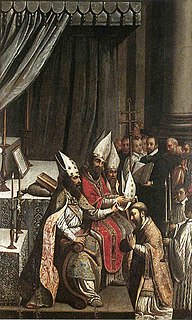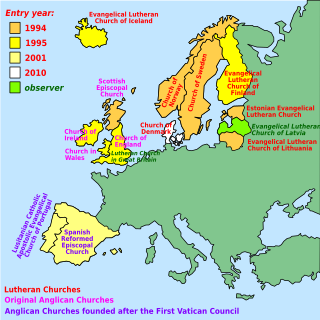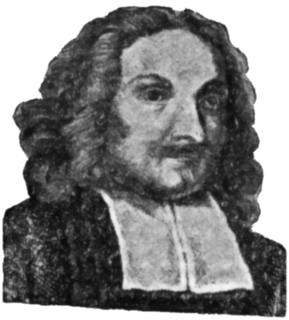Contents
| Part of a series on |
| Lists of Swedes |
|---|
 |
| List of Swedish people |
This is a list of Swedish clergy and theologians.
| Part of a series on |
| Lists of Swedes |
|---|
 |
| List of Swedish people |
This is a list of Swedish clergy and theologians.

Apostolic succession is the method whereby the ministry of the Christian Church is held to be derived from the apostles by a continuous succession, which has usually been associated with a claim that the succession is through a series of bishops. Christians of the Roman Catholic, Eastern Orthodox, Oriental Orthodox, Old Catholic, Moravian, Hussite, Anglican, Church of the East, and Scandinavian Lutheran traditions maintain that "a bishop cannot have regular or valid orders unless he has been consecrated in this apostolic succession". Each of these groups does not necessarily consider consecration of the other groups as valid.

A bishop is an ordained member in a religious institution, who is entrusted with a position of authority and oversight.

In certain Christian churches, holy orders are the ordained ministries of bishop, priest (presbyter), and deacon, and the sacrament or rite by which candidates are ordained to those orders. Churches recognizing these orders include the Catholic Church, the Eastern Orthodox, Oriental Orthodox, Anglican, Assyrian, Old Catholic, Independent Catholic and some Lutheran churches. Except for Lutherans and some Anglicans, these churches regard ordination as a sacrament. The Anglo-Catholic tradition within Anglicanism identifies more with the Roman Catholic position about the sacramental nature of ordination.

A priest is a religious leader authorized to perform the sacred rituals of a religion, especially as a mediatory agent between humans and one or more deities. They also have the authority or power to administer religious rites; in particular, rites of sacrifice to, and propitiation of, a deity or deities. Their office or position is the priesthood, a term which also may apply to such persons collectively. A priest may have the duty to hear confessions periodically, give marriage counseling, provide prenuptial counseling, give spiritual direction, teach catechism, or visit those confined indoors, such as the sick in hospitals and nursing homes.

Clergy are formal leaders within established religions. Their roles and functions vary in different religious traditions, but usually involve presiding over specific rituals and teaching their religion's doctrines and practices. Some of the terms used for individual clergy are clergyman, clergywoman, clergyperson, churchman, and cleric, while clerk in holy orders has a long history but is rarely used.

The Church of Sweden is an Evangelical Lutheran national church in Sweden. A former state church, headquartered in Uppsala, with just under 5.8 million members at year end 2020, it is the largest Christian denomination in Sweden, the largest Lutheran denomination in Europe and the third-largest in the world, after the Ethiopian Evangelical Church Mekane Yesus and the Evangelical Lutheran Church in Tanzania.

The Reverend is an honorific style most often placed before the names of Christian clergy and ministers. There are sometimes differences in the way the style is used in different countries and church traditions. The Reverend is correctly called a style but is often and in some dictionaries called a title, form of address, or title of respect. The style is also sometimes used by leaders in non-Christian religions such as Judaism and Buddhism.

A pastor is the leader of a Christian congregation who also gives advice and counsel to people from the community or congregation. In Lutheranism, Catholicism, Eastern Orthodoxy, Oriental Orthodoxy and Anglicanism, pastors are always ordained. In Methodism, pastors may be either licensed or ordained.

Ordination is the process by which individuals are consecrated, that is, set apart and elevated from the laity class to the clergy, who are thus then authorized to perform various religious rites and ceremonies. The process and ceremonies of ordination vary by religion and denomination. One who is in preparation for, or who is undergoing the process of ordination is sometimes called an ordinand. The liturgy used at an ordination is sometimes referred to as an ordination.

The Porvoo Communion is a communion of 15 predominantly northern European Anglican and Evangelical Lutheran churches, with a couple of far-southwestern European church bodies of the same denomination. It was established in 1992 by a theological agreement entitled the Porvoo Common Statement which establishes full communion between and among these churches. The agreement was negotiated in the town of Järvenpää in Finland, but the communion's name comes from the nearby city of Porvoo, where a joint Eucharist was celebrated in Porvoo Cathedral after the formal signing in Järvenpää.

Laurentius PetriNericius was a Swedish clergyman and the first Evangelical Lutheran Archbishop of Sweden. He and his brother Olaus Petri are, together with the King Gustav Vasa, regarded as the main Lutheran reformers of Sweden. They are commemorated by the Evangelical Lutheran Church in America on 19 April.

Olof Persson, sometimes Petersson, better known under the Latin form of his name, Olaus Petri, was a clergyman, writer, judge, and major contributor to the Protestant Reformation in Sweden. His brother, Laurentius Petri, became the first Evangelical Lutheran Archbishop of Sweden.

The Archbishop of Uppsala has been the primate of Sweden in an unbroken succession since 1164, first during the Catholic era, and from the 1530s and onward under the Lutheran church.

The Evangelical Lutheran Church of Latvia is a Lutheran Protestant church in Latvia. Latvia's Lutheran heritage dates back to the Reformation. Both the Nazi and communist regimes persecuted the church harshly before religious freedom returned to Latvia in 1988. Unlike Estonia, where state atheism and the ongoing European secularization reduced the once 80% Lutheran majority to almost 10% by 2011, the Latvian Lutheran church had dropped to around 20% but has recovered slightly and now includes approximately 30% of the population.

The ordination of lesbian, gay, bisexual and/or transgender (LGBT) clergy who are open about their sexuality or gender identity; are sexually active if lesbian, gay, or bisexual; or are in committed same-sex relationships is a debated practice within some contemporary Christian denominations.

Ordination is the process by which individuals are consecrated, that is, set apart as clergy to perform various religious rites and ceremonies such as celebrating the sacraments. The process and ceremonies of ordination varies by denomination. One who is in preparation for, or who is undergoing the process of ordination is sometimes called an ordinand. The liturgy used at an ordination is sometimes referred to as an ordinal.
This is a timeline of women in religion. See also: Timeline of women in religion in the United States.